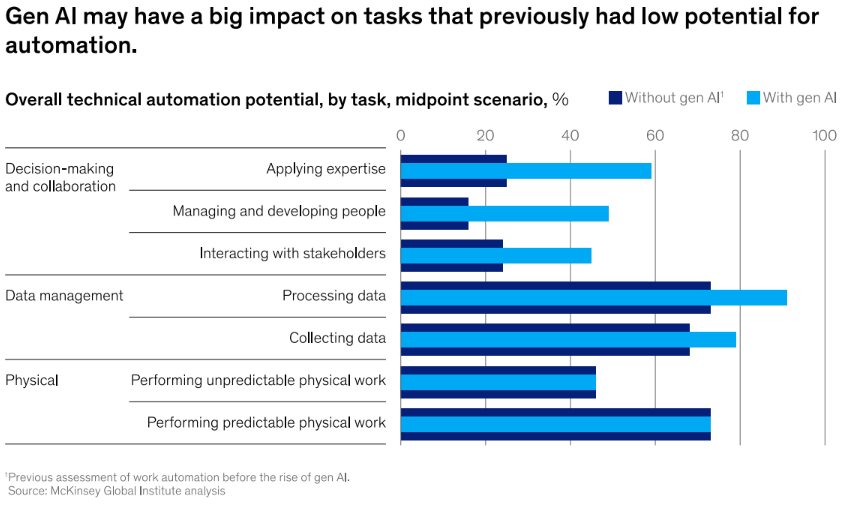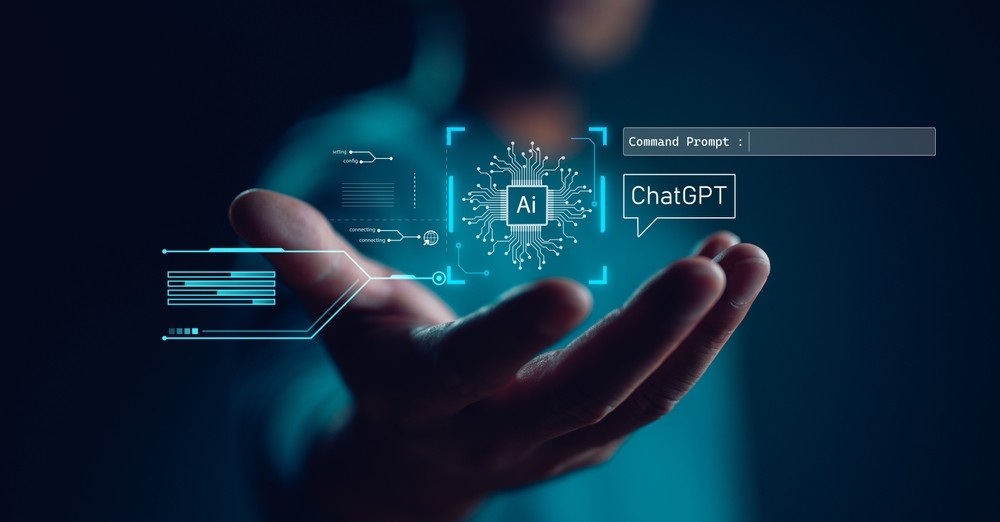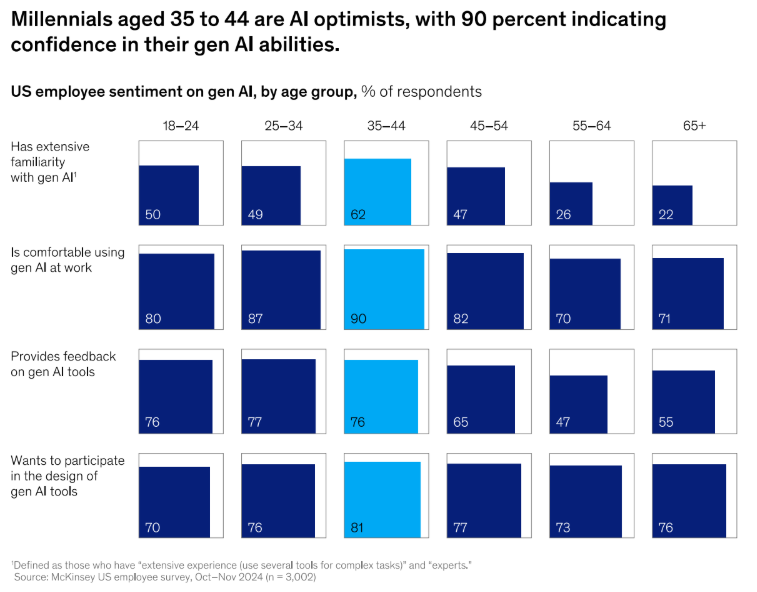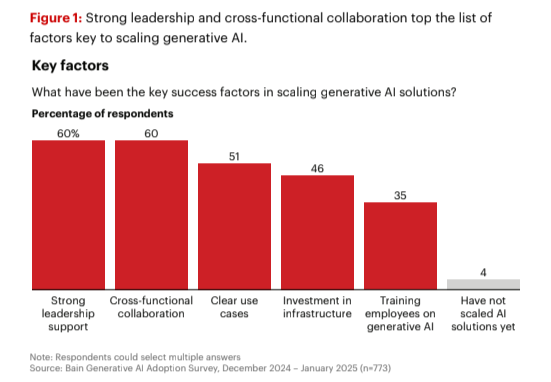Hey everyone, let’s chat about something super exciting: how AI is changing the game at work, and how we can all win in this new era!
Dreaming Big: A World Where We Team Up with AI
Imagine a workplace where AI isn’t some scary robot stealing jobs, but your awesome sidekick. Think about:
- Supercharged Productivity: AI handles the boring, repetitive stuff, freeing you up to focus on the creative and strategic work you actually enjoy. This state of AI super-agency boosts everyone’s game.
- New Skills, New Opportunities: AI helps lower the bar to learn new things, making it easier for you to become proficient in different areas. This means more opportunities to grow and take on exciting challenges.
- Working Smarter, Not Harder: AI can summarize information, help you brainstorm ideas, and even draft initial versions of documents. It’s like having a super-smart assistant available 24/7.
- Better Together: It’s not about humans versus AI, but humans and AI collaborating to achieve amazing things. Think of AI as a teammate that amplifies your abilities.
The Reality Check: We’re Not Quite There Yet
Here’s a recent head-scratcher: C-suite leaders think only about 4% of employees use generative AI for a good chunk of their daily tasks, but employees themselves say that number is three times higher!* This shows a real disconnect in understanding how quickly AI is becoming part of our work lives.
* (AI in the workplace report for 2025 by McKinsey)

Uh Oh, What’s Holding Us Back?
So, if the future with AI is so bright, why aren’t we all living it yet? There are a few bumps in the road:
- Leaders Aren’t Leading the Charge: Surprisingly, the biggest hurdle isn’t that employees fear AI. It’s that leaders aren’t setting bold enough goals and aren’t moving fast enough to integrate AI effectively.
- Not Enough Training and Support: Employees are actually eager to learn AI skills and want more formal training. But many feel they aren’t getting the support they need.
- Worries About Accuracy and Safety: People are naturally concerned about whether AI will make mistakes or create security risks. They need to trust that these systems are reliable and ethical.
- Fear of Losing Jobs: Let’s be honest, the thought of AI taking over jobs is definitely on people’s minds.
- Lack of Understanding How to Use AI: Even if employees are using AI, they might not know how to use it to its full potential or how it fits into their daily workflows.
- “Black Box” Decisions: Sometimes, it’s hard to understand why an AI makes a certain decision, which can make it difficult to trust and fix errors.
Our Two Cents: We Can Totally Nail This!
We truly believe that the awesome future we painted earlier is totally within our reach if we tackle these challenges head-on. Empowering employees through proper training and involving them in how AI is developed is the key to unlocking AI’s full potential and making it a win-win for everyone.
Let’s Get Practical: How Do We Empower Our Teams?
Here are some things we think are crucial:
- Invest Big in Training: Companies need to provide formal training programs to help employees understand AI, learn how to use AI tools effectively, and develop new skills for an AI-driven world. This training should be tailored to different roles.
- Give Access to AI Tools: Let employees get their hands dirty! Provide access to beta programs and pilot projects so they can experiment with AI and see its benefits firsthand.
- Make it Human-Centric: When developing AI solutions, involve employees from different backgrounds and roles right from the start. This ensures that the AI tools are actually useful and meet people’s needs. Practices like design-thinking and getting feedback from users are super important.
- Be Open and Honest: Communicate clearly about how AI will impact jobs and what new skills will be needed. Address concerns about job displacement directly and highlight the new opportunities that will emerge.
- Focus on Change Management: Adopting AI isn’t just about technology; it’s about changing how we work. Strong change management strategies are essential to help employees adapt and embrace new ways of working.
- Promote a Culture of Experimentation: Encourage employees to explore AI and share their learnings. Create a culture where it’s okay to experiment and learn from failures.
- Build Trust and Ensure Safety: Implement robust testing, monitoring, and ethical guidelines for AI systems. Make sure employees understand how these systems work and that their data is protected.
- Highlight Successes: Share stories of how AI is already helping employees, and the company achieve its goals. This helps build excitement and motivation.
- Leadership Needs to Lead: It all starts at the top! Leaders need to champion AI adoption, set clear goals, and actively participate in the transformation.
What are your thoughts on this? How can we best empower employees in the age of AI and ensure a future where everyone benefits? Let’s get the conversation going!
AI is reshaping the workplace—and the brands that embrace it thoughtfully will lead the way. Just like AI enhances how we work, smart marketing strategies enhance how you connect with your audience. Ready to evolve your brand in the age of AI?
Our marketing and branding experts can help you adapt, stand out, and grow—just like we’re helping businesses adapt to this AI-powered future.To know more about how we can take your organization to a higher orbit, visit Our Services Page or drop in an email to connect.)
FAQs
A successful transition requires a mix of formal training, cross-functional collaboration, clear communication, and change management. Start with pilot programs, gather employee feedback, and scale responsibly.
Employees should focus on developing analytical thinking, adaptability, digital literacy, and collaboration skills. Comfort with AI tools and a mindset of continuous learning are key differentiators.
Transparent communication is essential. Highlight how AI complements human roles, create ups-killing opportunities, and emphasize how AI adoption leads to new job functions and career growth.
Common risks include data privacy concerns, bias in algorithms, over-reliance on AI, and lack of governance. These can be mitigated with robust ethical guidelines, human oversight, and transparent usage policies.
Leaders must set clear, ambitious goals, model AI usage in their workflows, allocate resources for employee training, and foster a culture of innovation and experimentation.


